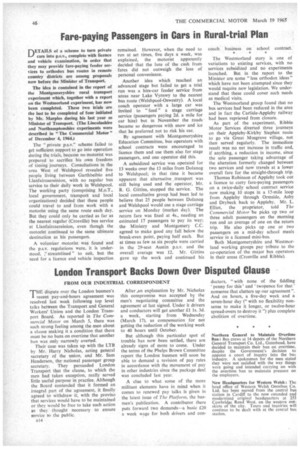Fare-paying Passengers in Cars in Rural-trial Plan
Page 48

If you've noticed an error in this article please click here to report it so we can fix it.
DETAILS of a scheme to turn private cars into p.s.v., complete with licence and vehicle examination, in order that they may provide fare-paying feeder services to orthodox bus routes in remote country districts are among proposals now before the Minister of Transport.
The idea is contained in the report of the Montgomeryshire rural transport experiment which, together with a report on the Westmorland experiment, has now been completed. These two trials are the last to be completed of four initiated by Mr. Marples during his last year as Minister of Transport. (The Lincolnshire and Northamptonshire experiments were described in "The Commercial Motor" of December 4, 1944.)
The private p.s.v." scheme failed to get sufficient support to go into operation during the trials, because no motorist was prepared to sacrifice his own freedom of timing journeys. Consultations in the area West of Welshpool revealed five people living between Garthbeibio and Llanfaircaereinion, with no regular bus service to their daily work in Welshpool. The working party (comprising M.o.T., local government, transport and local organizations) decided that these people could travel to and from work with a motorist using the same route each day. But they could only be carried as far as the nearest regular (Crosville) bus service at Llanfaircaereinion, even though the motorist continued to the same ultimate destination as his passengers.
A volunteer motorist was found and the p.s.v. regulations were, it is understood" streamlined" to suit, but the need for a licence and vehicle inspection
remained. However, when the need to run at set times, five days a week, was explained, the motorist apparently decided that the lure of the cash from fares did not outweigh the loss of personal convenience.
Another idea which reached an advanced stage but failed to get a trial run was a hire-car feeder service from areas near Lake Vyrnwy to the nearest bus route (Welshpool-Oswestry). A local coach operator with a large car was invited to " feed " a stage carriage service (passengers paying 2d. a mile for car hire) but in November the roads became so dangerous with snow and ice that he preferred not to risk his car.
By agreement with Montgomeryshire Education Committee, bus operators with school contracts were encouraged to licence them and use them also for stage passengers, and one operator did this.
A subsidized service was operated for 13 weeks over the 13 miles from Dolanog to Welshpool; in that time it became apparent that alternative transport was still being used and the operator, Mr. R. G. Gittins, stopped the service. The local consultative group had been led to believe that 25 people between Dolanog and Welshpool would use a stage carriage service on Monday (market day). The return fare was fixed at 4s., needing an estimated 17 passengers to pay its way; the Ministry and Montgomery C.C. agreed to make good any fall below the break-even point, paying half each. But at times as few as six people were carried in the 29-seat Austin p.s.v. and the overall average was 12. Mr. Gittins gave up the work and continued his coach business on school contract.
The Westmorland story is one of variations to existing services, with no services subsidized and no experiments launched. But in the report to the Minister are some "less orthodox ideas" which have not been attempted since they would require new legislation. We understand that these could cover such needs as medical visits.
The Westmorland group found that no bus services had been reduced in the area and in fact the Carlisle-Appleby railway had been reprieved from closure.
As part of the experiment, Ribble Motor Services diverted three journeys on their Appleby-Kirkby Stephen route to go via Great Musgrave village, not then served regularly. The immediate result was no net increase in traffic and, if anything, a reduction in income, since the sole passenger taking advantage of the alteration formerly changed between two services and now travels at a lower overall fare for the straight-through trip.
Thomas Robinson of Appleby took out a licence to carry fare-paying passengers on a twice-daily school contract service now making 10 stops in a 15-mile loop from Appleby through Onnside, Asby and Drybeck back to Appleby. Mr. L. Elliot, the proprietor, told The Commercial Motor he picks up two or three adult passengers on the morning run and an average of one on the return trip. He also picks up one or two passengers on a mid-day school meals service in a licensed mini-bus.
Both Montgomeryshire and Westmorland working groups pay tribute to the co-operation of the major bus operators in their areas (Crosville and Ribble).












































































































































